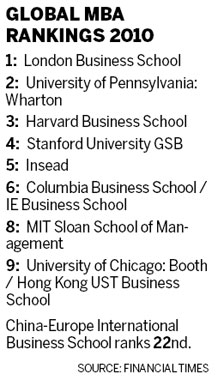Economy
Getting schooled in big business
By Andrew Moody (China Daily)
Updated: 2010-08-16 09:57
 |
Large Medium Small |
According to some, business education in China is not all to do with strict adherence to syllabuses and standards.
One senior lecturer, who did not want to be named, said some Executive MBA (EMBA) courses, typically designed for senior managers, offered at some lesser institutions represented the darker side of the management education industry.
"They are basically friendship clubs where you get to know government officials also enrolled on the course. You pay your fee and you are guaranteed your degree. It has little to do with studying at all but more about networking and advancement," he said.
Xiao Zhixing, associate professor of management at CEIBS in Shanghai, which is regarded as China's leading business school, said the differences between Western and China institutions could be exaggerated.
"CEIBS is very international in the way that it does things. You wouldn't be surprised if you went to London Business School and they were teaching in exactly the same way as we are in Shanghai," he said.

He added, however, there can be a difference in the way students approach the courses.
"Western students like to think things out for themselves. Whatever the professor says they will try and interpret it in their own way. Chinese students tend to be less independent thinkers. That, in general, is the difference. They tend to follow the words of the teacher," he said.
Thun at the Said Business School, who speaks fluent Chinese and who has both studied and worked in China, agrees Chinese students tend to be less participative.
"The Americans on our courses will just talk, talk, talk, if you let them," he said indicating a yapping movement with his hand. "The students from Asia you have to draw out more. The Chinese students are excellent, however."
Li at Hong Kong Polytechnic University believes the Harvard case study approach, where students sit around discussing real life business examples, does not tend to work as well in China.
"Chinese students tend to have this view there should be a model answer whereas the point of this kind of approach is the actual analysis and discussion. There could actually be many different answers. Chinese students tend to avoid courses which make heavy use of case studies," he said.
But Thun added business education anywhere in the world now had to reflect the growing importance of China and the rest of Asia. His own role - that of a lecturer specifically in Chinese business studies - was indicative of this.
"The case I make to my students is that the advanced industrial countries had 80 percent of the share of global gross domestic product (GDP) in 2000 and 20 percent was emerging. By 2050, this is supposed to have reversed," he said.
He said this will involve the rewriting of MBA syllabuses because the economies of China and India will be fundamentally different to Western economies.
"Unlike in Japan and South Korea, which have developed very rapidly, per capita income levels will remain relatively low. As a result, if you are a German engineer and looking to increase the performance of a car, if you add too many extra bells and whistles you are going to price yourself out of the market. How we teach business will have to accommodate this."
|
||||
"The German and the Japan business education model is essentially to learn by doing the job. China, by setting up all these MBA programs, is following the US approach," he said.
"I think having an MBA qualification makes it easier for Chinese managers to work all over the world. If someone has an MBA, whether they come from Japan, China, Europe, or the US, it demonstrates you have the basic knowledge."
But he added that that did not mean there were not questions about business and management education, not just in China but in the West, too.
"There are questions being asked as well in the United States following the financial crisis. Business schools are reflecting what business programs need to be changed, " he said.



